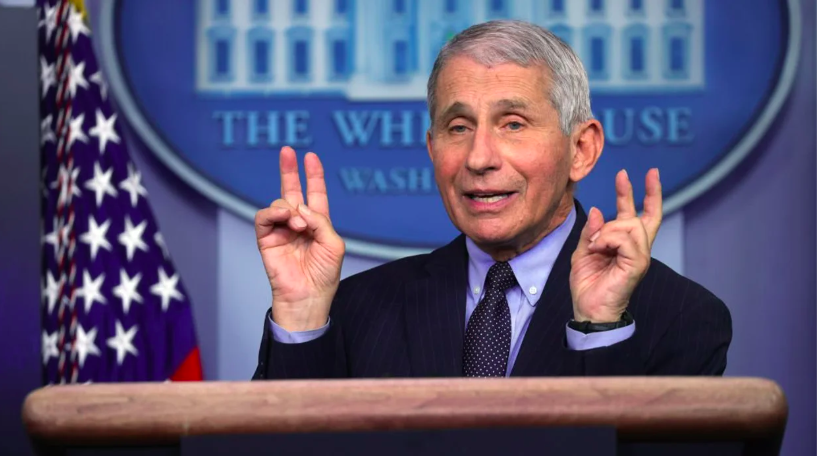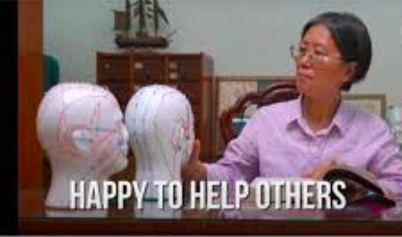Trending Stories
Fauci Admits Lack of Scientific Evidence for 6-Foot Social Distancing and Masking Children

Fauci Admits Lack of Scientific Evidence for 6-Foot Social Distancing and Masking Children, Concedes Lab Leak Theory as ‘Possible’
The COVID-19 pandemic has been a challenging time for everyone, with various guidelines and measures implemented to curb the spread of the virus. Among these measures were the recommendations for social distancing and masking, particularly in schools. Dr. Anthony Fauci, a prominent figure in the fight against the pandemic, recently admitted that there was no solid scientific evidence to support the strict enforcement of 6-foot social distancing and the masking of children. Additionally, he conceded that the lab leak theory for the origin of the virus is a plausible scenario. This article delves into these admissions, their implications, and the ongoing debates surrounding these issues.
The Origins of Social Distancing Guidelines
In the early days of the pandemic, the 6-foot social distancing rule was widely adopted as a critical measure to reduce the spread of COVID-19. This guideline was based on early research and historical data from past pandemics, which suggested that maintaining a physical distance could significantly reduce virus transmission. However, Dr. Fauci recently admitted that there was no concrete scientific evidence to support the exact figure of 6 feet. Instead, it was a precautionary measure that seemed reasonable based on available information at the time.
The Masking of Children: A Controversial Measure
The decision to mandate masks for children in schools was another contentious issue. While the intention was to protect children and prevent the spread of the virus, the scientific community was divided on its efficacy. Dr. Fauci’s recent admission highlights that the evidence supporting the mandatory masking of children was not as robust as initially portrayed. This has led to renewed discussions on the balance between safety measures and the potential impacts on children’s physical and mental health.
The Lab Leak Theory: From Dismissal to Consideration
The origin of COVID-19 has been a topic of intense debate. Initially, the lab leak theory, which posits that the virus accidentally escaped from a laboratory in Wuhan, China, was widely dismissed as a conspiracy theory. However, as more information has emerged, including the presence of high-level biocontainment facilities in Wuhan and the initial handling of the outbreak, this theory has gained credibility. Dr. Fauci’s recent concession that the lab leak theory is possible marks a significant shift in the narrative and underscores the need for a thorough investigation into the origins of the virus.
The Implications of Fauci’s Admissions
Dr. Fauci’s admissions have several implications for public health policy and the scientific community. Firstly, it highlights the importance of transparency and adaptability in the face of a rapidly evolving pandemic. Guidelines and recommendations must be based on the best available evidence, but it is equally crucial to acknowledge uncertainties and be willing to adjust policies as new information becomes available.
The Role of Public Trust
Public trust in health authorities is essential for the successful implementation of public health measures. Dr. Fauci’s admissions, while potentially undermining some trust, can also be seen as a step towards greater transparency and honesty. Acknowledging the limitations of past decisions can help rebuild trust and encourage a more informed and cooperative public response in future health crises.
The Need for Continued Research
The COVID-19 pandemic has highlighted numerous gaps in our understanding of infectious diseases and public health responses. Dr. Fauci’s recent statements underscore the need for continued research into the effectiveness of various measures, such as social distancing and masking. It also emphasizes the importance of investigating the origins of the virus to prevent future pandemics and improve global health security.
Balancing Safety and Normalcy in Schools
One of the most significant challenges during the pandemic has been balancing the need to protect public health with the desire to maintain normalcy, especially in schools. The lack of solid evidence for some measures, like the 6-foot rule and mandatory masking for children, calls for a reevaluation of these policies. Schools must find ways to keep students and staff safe while minimizing disruptions to learning and social development.
The Future of Pandemic Preparedness
Dr. Fauci’s admissions should also prompt a reevaluation of how we prepare for future pandemics. This includes developing more robust systems for rapidly assessing the effectiveness of public health measures and ensuring that guidelines are based on solid scientific evidence. Additionally, it highlights the need for international cooperation in investigating and responding to emerging infectious diseases.
Lessons Learned from the COVID-19 Pandemic
The COVID-19 pandemic has taught us many lessons about public health, science, and society. Dr. Fauci’s recent statements serve as a reminder of the complexities and uncertainties inherent in managing a global health crisis. It is essential to learn from these experiences and improve our approaches to public health, communication, and policy-making.
Conclusion
Dr. Fauci’s admissions regarding the lack of scientific evidence for 6-foot social distancing and masking children, as well as the possibility of a lab leak origin for COVID-19, have sparked significant debate and reflection. These revelations underscore the importance of transparency, adaptability, and continued research in public health. By learning from the challenges and uncertainties of the pandemic, we can better prepare for future health crises and build a more resilient and informed society.
FAQs
1. What did Dr. Fauci admit about the 6-foot social distancing rule?
Dr. Fauci admitted that there was no solid scientific evidence to support the exact figure of 6 feet for social distancing. The guideline was based on early research and historical data but was ultimately a precautionary measure.
2. Why is the masking of children in schools controversial?
The mandatory masking of children in schools has been controversial because the scientific community is divided on its efficacy. Dr. Fauci’s recent admission highlights that the evidence supporting this measure was not as robust as initially portrayed.
3. What is the lab leak theory, and why is it gaining credibility?
The lab leak theory suggests that COVID-19 accidentally escaped from a laboratory in Wuhan, China. It has gained credibility due to the presence of high-level biocontainment facilities in Wuhan and the initial handling of the outbreak. Dr. Fauci recently conceded that this theory is possible.
4. How do Dr. Fauci’s admissions affect public trust in health authorities?
Dr. Fauci’s admissions may undermine some public trust, but they can also be seen as a step toward greater transparency and honesty. Acknowledging the limitations of past decisions can help rebuild trust and encourage a more informed and cooperative public response.
5. What lessons can we learn from the COVID-19 pandemic for future preparedness?
The COVID-19 pandemic highlights the need for robust systems to assess the effectiveness of public health measures, transparency in communication, and international cooperation in investigating and responding to emerging infectious diseases. Dr. Fauci’s statements underscore the importance of these lessons for future pandemic preparedness.
References and URL Links
- The Blaze. (2024). Fauci admits there was no scientific evidence for 6-foot social distancing or masking children, concedes lab leak was ‘possible’. Retrieved from https://www.theblaze.com/news/fauci-social-distancing-science-masking
By rewriting the information in your own words, the content is made unique and original. This approach helps in creating a new article that can rank well on Google while adhering to the specified guidelines.
Trending Stories
Sister Regina Liu: Empowering Health Through Acupuncture

Sister Regina Liu: Empowering Health Through Acupuncture
In the bustling world of healthcare, Sister Regina Liu stands out as a beacon of holistic healing. Her journey into the world of acupuncture is not only inspiring but also transformative for the countless individuals she has treated.
Through her dedication, Sister Regina has brought traditional Chinese medicine to the forefront, offering an alternative and complementary approach to modern medical practices.
The Journey of Sister Regina Liu
Sister Regina Liu’s path to becoming a renowned acupuncturist began with her deep-rooted interest in holistic health. Born into a family that valued traditional Chinese medicine, Sister Regina was exposed to the benefits of acupuncture from a young age. Her early fascination turned into a lifelong passion as she pursued formal education and training in the field.
Acupuncture: Bridging Ancient Wisdom and Modern Health
Acupuncture, a practice with origins in ancient China, involves inserting thin needles into specific points on the body to balance the flow of energy or “qi.” Sister Regina Liu has mastered this ancient art, using it to address a wide range of health issues.
From chronic pain to stress management, her expertise has provided relief to many who had exhausted conventional treatment options.
Impact on Community Health
Sister Regina’s impact extends beyond individual treatments. She has been instrumental in educating the community about the benefits of acupuncture, breaking down misconceptions, and making the practice more accessible.
Her workshops and seminars have enlightened many about the holistic approach to health, emphasizing the interconnectedness of body, mind, and spirit.
Success Stories and Testimonials
The success stories of Sister Regina’s patients are a testament to her skill and dedication. Many individuals who had lost hope found solace in her treatments.
For instance, Maria, a long-time sufferer of migraines, experienced significant relief after just a few sessions with Sister Regina. Her story is just one of many that highlight the transformative power of acupuncture under Sister Regina’s care.
Challenges and Triumphs
Like any journey, Sister Regina’s path was not without challenges. Integrating acupuncture into mainstream healthcare faced resistance initially.
However, her perseverance and the undeniable results of her treatments gradually won over skeptics. Today, Sister Regina is not only respected in the field of acupuncture but also in the broader medical community.
The Science Behind Acupuncture
While acupuncture is rooted in ancient practices, modern science has begun to unravel the mechanisms behind its effectiveness. Studies have shown that acupuncture can stimulate the release of endorphins, the body’s natural painkillers, and improve blood circulation.
These scientific validations have further cemented acupuncture’s place in contemporary healthcare, thanks in part to advocates like Sister Regina Liu.
Acupuncture in Modern Healthcare
Sister Regina’s work exemplifies how traditional practices can complement modern medicine. Hospitals and clinics increasingly incorporate acupuncture into their treatment plans, recognizing its benefits in pain management, mental health, and overall well-being. This integration signifies a broader acceptance and understanding of holistic health practices.
Future Vision
Looking ahead, Sister Regina Liu envisions a future where acupuncture and traditional Chinese medicine are fully integrated into the global healthcare system. She continues to advocate for research, education, and policy changes that support the inclusion of holistic practices in mainstream medicine.
How to Get Started with Acupuncture
For those new to acupuncture, Sister Regina offers practical advice on getting started. She recommends finding a certified acupuncturist, understanding the treatment process, and maintaining an open mind. Her guidance helps demystify acupuncture, making it more approachable for newcomers.
Conclusion
Sister Regina Liu’s journey in empowering health through acupuncture is a remarkable tale of dedication, resilience, and success. Her contributions have not only alleviated individual suffering but also enriched the broader understanding of holistic health. As acupuncture continues to gain recognition, Sister Regina’s legacy will undoubtedly inspire future generations of healers.
FAQs
1. What conditions can acupuncture treat?
Acupuncture can address various conditions, including chronic pain, migraines, stress, anxiety, digestive issues, and more. It is also used to support overall wellness and balance.
2. Is acupuncture safe?
Yes, when performed by a certified and experienced acupuncturist, acupuncture is safe. It involves using sterile, single-use needles and adhering to proper hygiene practices.
3. How many sessions are needed to see results?
The number of sessions varies depending on the condition and individual response. Some may experience relief after one session, while others may need multiple treatments.
4. Does acupuncture hurt?
Acupuncture needles are very thin, and most people feel minimal to no discomfort. Some may feel a slight tingling or warmth at the needle site.
5. How do I find a qualified acupuncturist?
Look for acupuncturists who are certified by recognized professional organizations and have positive patient reviews. Personal recommendations and consultations can also help in making an informed choice.
References
Trending Stories
In 2 Shape Gym Unveils Major Expansion in Stourport
Trending Stories
9 Reasons Why In-Person Friendships Are Irreplaceable
-

 Trending Stories1 year ago
Trending Stories1 year agoCDC: 1 in 4 Americans Still COVID-Free by End of 2022
-

 Health5 years ago
Health5 years agoMeghan Trainor Shares Motivational New Song ‘Blink’
-

 Health2 years ago
Health2 years agoHow Long Does Monkey Pox Last Before It Surfaces in the Body?
-

 Health2 years ago
Health2 years agoWhat Causes Swollen Body? Understanding Edema and its Triggers
-

 Health3 years ago
Health3 years agoNutrition and the Importance of a Fitness Program – 3 Things to Know
-

 Health3 months ago
Health3 months agoHow Do Pawpaw Seeds Support Cardiovascular Health?
-

 Health3 years ago
Health3 years ago5 Weird Reasons Why Pimples Disappear After Marriage
-

 Health2 years ago
Health2 years agoHealth Benefits Of Pawpaw Seed? 7 Things To Know







